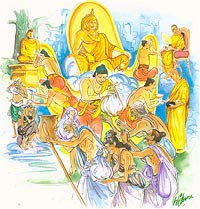13 02 2012 LESSON 523
DhammapadaVerse 68 Sumanamalakara Vatthu Happiness Results From Good Deeds
FREE ONLINE eNālandā Research & Practice UNIVERSITY & BUDDHIST GOOD NEWS LETTER
Through :http://sarvajan.ambedkar.org
THE BUDDHIST ON LINE GOOD
NEWS LETTER
COURSE PROGRAM
LESSONS 523
Practice a Sutta a Day
Keeps Dukkha Away

Verse 68. Happiness
Results From Good Deeds
But
well-made is that kamma
which done brings no remorse,
of which one senses the result
with glad mind and with joy.
Explanation:
It is good if one were to do such actions that would not bring repentance
later. One should do things that bring pleasant consequences.
Dhammapada Verse 68
Sumanamalakara Vatthu
Tanca
kammam katam sadhu
yam katva nanutappati
yassa patito sumano
vipikam patisevati.
Verse
68: That deed is well done if one has not to repent for having done it, and if
one is delightful and happy with the result of that deed.
The
Story of Sumana, the Florist
While
residing at the Jetavana monastery, the Buddha uttered Verse (68) of this book,
with reference to Sumana the florist.
A
florist, named Sumana, had to supply King Bimbisara of Rajagaha with jasmin
flowers every morning. One day, as he was going to the king’s palace he saw the
Buddha, with a halo of light-rays radiating from him, coming into town for
alms-food accompanied by many bhikkhus. Seeing the Buddha in his resplendent
glory, the florist Sumana felt a strong desire to offer his flowers to the
Buddha. Then and there, he decided that even if the king were to drive him out
of the country or to kill him, he would not offer the flowers to the king for
that day. Thus, he threw up the flowers to the sides, to the back and over and
above the head of the Buddha. The flowers remained hanging in the air; those
over the head formed a canopy of flowers and those at the back and the sides
formed walls of flowers. These flowers followed the Buddha in this position as
he moved on, and stopped when the Buddha stopped. As the Buddha proceeded,
surrounded by walls of flowers, and a canopy of flowers, with the six-coloured
rays radiating from his body, followed by a large entourage, thousands of
people inside and outside of Rajagaha came out of their houses to pay obeisance
to the Buddha. As for Sumana, his entire body was suffused with delightful
satisfaction (Piti).
The
wife of the florist Sumana then went to the king and said that she had nothing
to do with her husband failing to supply the king with flowers for that day.
The king, being a Sotapanna himself, felt quite happy about the flowers.
He came out to see the wonderful sight and paid obeisance to the Buddha. The
king also took the opportunity to offer alms-food to the Buddha and his
disciples. After the meal, the Buddha returned in the Jetavana monastery and
the king followed him for some distance. On arrival back at the palace King
Bimbisara sent for Sumana and offered him a reward of eight elephants, eight
horses, eight male slaves, eight female slaves, eight maidens and eight
thousand in cash.
At the
Jetavana monastery, the Venerable Ananda asked the Buddha what benefits Sumana
would gain by his good deed done on that day. The Buddha answered that Sumana,
having given to the Buddha without any consideration for his life, would not be
born in any of the four lower worlds (Apaya) for the next one hundred
thousand worlds and that eventually he would become a paccekabuddha. After
that, as the Buddha entered the Perfumed Hall (Gandhakuti) the flowers
dropped off of their own accord.
That
night, at the end of the usual discourse, the Buddha spoke in verse as follows:
|
Verse 68: That deed is ‘BJP, Cong not serious to bring back black money’Unnao (UP): Accusing Congress and BJP of not “Both BJP and Congress appear non-serious on the issue of bringing back Making an appeal to the electorate to vote for “The opposition parties are misleading the people and wrong opinion polls Attacking Congress for Claiming that her government had demanded Rs 80,000 crore for the state’s Congress was following “dynastic
|
